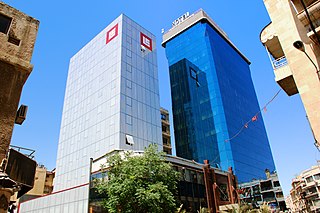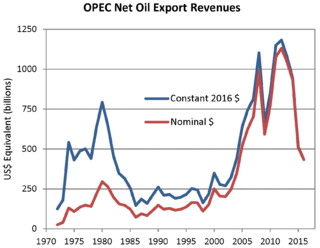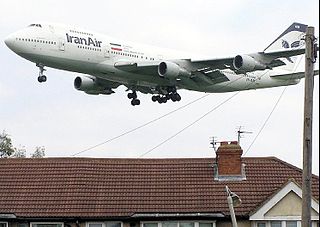
The economy of Iraq is dominated by the oil sector, which has provided about 99.7% of foreign exchange earnings during its modern history. As of 2021, the oil sector provides about 92% of foreign exchange earnings. Iraq's hitherto agrarian economy underwent rapid development following the 14 July Revolution (1958) which overthrew the Hashemite Iraqi monarchy. It had become the third-largest economy in the Middle East by 1980. This occurred in part because of the Iraqi government's successful industrialization and infrastructure development initiatives in the 1970s, which included irrigation projects, railway and highway construction, and rural electrification.

The economy of Libya depends primarily on revenues from the petroleum sector, which represents over 95% of export earnings and 60% of GDP. These oil revenues and a small population have given Libya one of the highest nominal per capita GDP in Africa.

Syria's economic situation has been turbulent and their economy has deteriorated considerably since the beginning of the Syrian civil war, which erupted in March 2011.

"State Sponsors of Terrorism" is a designation applied by the United States Department of State to countries which the Department alleges to have "repeatedly provided support for acts of international terrorism". Inclusion on the list enables US government to impose four main types of unilateral sanctions: restrictions of foreign aid, ban of weapons sales, export controls of dual-use equipment and other miscellaneous economic sanctions. The State Department is required to maintain the list under section 1754(c) of the National Defense Authorization Act for Fiscal Year 2019, section 40 of the Arms Export Control Act, and section 620A of the Foreign Assistance Act.

The Office of Foreign Assets Control (OFAC) is a financial intelligence and enforcement agency of the U.S. Treasury Department. It administers and enforces economic and trade sanctions in support of U.S. national security and foreign policy objectives. Under Presidential national emergency powers, OFAC carries out its activities against foreign states as well as a variety of other organizations and individuals, like terrorist groups, deemed to be a threat to U.S. national security.

Economic sanctions are commercial and financial penalties applied by states or institutions against states, groups, or individuals. Economic sanctions are a form of coercion that attempts to get an actor to change its behavior through disruption in economic exchange. Sanctions can be intended to compel or deterrence.

Petrodollar recycling is the international spending or investment of a country's revenues from petroleum exports ("petrodollars"). It generally refers to the phenomenon of major petroleum-exporting states, mainly the OPEC members plus Russia and Norway, earning more money from the export of crude oil than they could efficiently invest in their own economies. The resulting global interdependencies and financial flows, from oil producers back to oil consumers, can reach a scale of hundreds of billions of US dollars per year – including a wide range of transactions in a variety of currencies, some pegged to the US dollar and some not. These flows are heavily influenced by government-level decisions regarding international investment and aid, with important consequences for both global finance and petroleum politics. The phenomenon is most pronounced during periods when the price of oil is historically high.

United States sanctions are imposed against countries that violate the interests of the United States. Sanctions are used with the intent of damaging another country's economy in response to unfavorable policy or decisions. The United States has imposed two-thirds of the world's sanctions since the 1990s. Numerous American unilateral sanctions against various countries around the world have been criticized by different commentators. It has imposed economic sanctions on more than 20 countries since 1998.

The United States has since 1979 applied various economic, trade, scientific and military sanctions against Iran. United States economic sanctions are administered by the Office of Foreign Assets Control (OFAC), an agency of the United States Department of the Treasury. Currently, United States sanctions against Iran include an embargo on dealings with the country by the United States, and a ban on selling aircraft and repair parts to Iranian aviation companies.
The National Oil Corporation is the national oil company of Libya. It dominates Libya's oil industry, along with a number of smaller subsidiaries, which combined account for around 70% the country's oil output. Of NOC's subsidiaries, the largest oil producer is the Waha Oil Company (WOC), followed by the Arabian Gulf Oil Company (Agoco), Zueitina Oil Company (ZOC), and Sirte Oil Company (SOC).

Stuart A. Levey was the first Under Secretary for Terrorism and Financial Intelligence within the United States Department of the Treasury. He was sworn in on July 21, 2004 as a political appointee of President George W. Bush. President Barack Obama asked Levey to remain in his position and Levey was one of only a small number of Senate-confirmed Bush appointees who served in the Obama Administration. After leaving the government, Levey joined the private sector as chief legal officer of HSBC, CEO of Diem Association and chief legal officer of Oracle.

Libya–United States relations are the bilateral relations between the State of Libya and the United States of America. Relations are today cordial and cooperative, with particularly strong security cooperation only after the 2012 attack on the US liaison office or mission in Benghazi. Furthermore, a Gallup poll conducted in March and April 2012 found that Libyans had "among the highest approval" of US leadership in the entire Middle East and North Africa region.

The Iran and Libya Sanctions Act of 1996 (ILSA) was a 1996 act of the United States Congress that imposed economic sanctions on firms doing business with Iran and Libya. On September 20, 2004, the President signed an Executive Order to terminate the national emergency with respect to Libya and to end IEEPA-based economic sanctions on Libya. On September 30, 2006, the Act was renamed the Iran Sanctions Act (ISA). The Act was originally limited to five years, and has been extended several times. On December 1, 2016, ISA was extended for a further ten years.
There have been a number of sanctions against Iran imposed by a number of countries, especially the United States, and international entities. Iran was the most sanctioned country in the world until it was surpassed by Russia following its invasion of neighboring Ukraine in February 2022.
International sanctions are political and economic decisions that are part of diplomatic efforts by countries, multilateral or regional organizations against states or organizations either to protect national security interests, or to protect international law, and defend against threats to international peace and security. These decisions principally include the temporary imposition on a target of economic, trade, diplomatic, cultural or other restrictions that are lifted when the motivating security concerns no longer apply, or when no new threats have arisen.

HM Treasury v Ahmed [2010] UKSC 2 is a UK constitutional law and human rights case concerning the United Nations Act 1946 and the powers it grants to the executive to issue terrorism control orders.

The Specially Designated Nationals and Blocked Persons List, also known as the SDN List, is a United States government sanctions/embargo measure targeting U.S.-designated terrorists, officials and beneficiaries of certain authoritarian regimes, and international criminals. The list is managed by the U.S. Treasury’s Office of Foreign Assets Control (OFAC). When individuals are added to the list of Specially Designated Nationals (SDN), their U.S. assets are blocked. Moreover, their names are added to automated screening systems used by banks in the United States and many foreign countries, making it difficult for them to open or hold accounts, transfer monies, or transact property internationally. Any individual or entity that provides support related to terrorism, drug trafficking or unauthorized military use to any person or entity appearing on the SDN list risks being penalized under the USA PATRIOT Act.
Qatar has been accused of allowing terror financiers to operate within its borders, which has been one of the justifications for the Qatar diplomatic crisis that started in 2017 and ended in 2021. In 2014, David S. Cohen, then United States Under Secretary of the Treasury for Terrorism and Financial Intelligence, accused Qatari authorities of allowing financiers who were on international blacklists to live freely in the country: "There are U.S.- and UN-designated terrorist financiers in Qatar that have not been acted against under Qatari law." Accusations come from a wide variety of sources including intelligence reports, government officials, and journalists.

The 2010s oil glut was a significant surplus of crude oil that started in 2014–2015 and accelerated in 2016, with multiple causes. They include general oversupply as unconventional US and Canadian tight oil production reached critical volumes, geopolitical rivalries among oil-producing nations, falling demand across commodities markets due to the deceleration of the Chinese economy, and possible restraint of long-term demand as environmental policy promotes fuel efficiency and steers an increasing share of energy consumption away from fossil fuels.

During the crisis in Venezuela, governments of the United States, the European Union, Canada, Mexico, Panama and Switzerland applied individual sanctions against people associated with the administration of Nicolás Maduro. The sanctions were in response to repression during the 2014 Venezuelan protests and the 2017 Venezuelan protests, and activities during the 2017 Venezuelan Constituent Assembly election and the 2018 Venezuelan presidential election. Sanctions were placed on current and former government officials, including members of the Supreme Tribunal of Justice (TSJ) and the 2017 Constituent National Assembly (ANC), members of the military and security forces, and private individuals accused of being involved in human rights abuses, corruption, degradation in the rule of law and repression of democracy.















